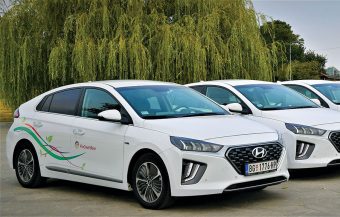ProCredit Bank has been operating in Serbia for over two decades. Sustainability is not just a part of our corporate culture – it represents our essence, which we strive to integrate into every business process. We are proud to be the first bank with an environmental management system, adapting all our operations to sustainable practices.
Environmental Protection as a Business Priority
All banks within the ProCredit Group adhere to high standards regarding the environmental impact of their business activities. Our internal environmental management system involves monitoring the bank’s energy and other resource consumption, systematically reducing energy and resource usage, and raising employee awareness while cooperating with green suppliers.
We actively work on reducing our environmental footprint by implementing various measures, including monitoring and measuring CO2 emissions arising from our operations. We continuously analyze emissions—such as electricity consumption, heating, and vehicle use (emission range 1 and 2)—to identify areas for improvement and apply effective strategies to reduce emissions. One such measure includes increasing the use of renewable electricity by investing in our photovoltaic systems and collaborating with clean energy suppliers.
The Future of Ecological Transport
Although ecological transport is still considered an innovation, many responsible organizations have already implemented it. It involves using transportation methods that emit fewer greenhouse gases.
Recognizing the negative environmental impact of motor vehicles, we decided to expand our fleet of company vehicles with electric and hybrid cars. We acquired our first electric vehicle in 2016. Since 2023, 100 percent of our fleet consists of low-emission vehicles (electric, plug-in hybrid, and hybrid vehicles).
As part of our efforts to promote sustainable mobility, we have installed 42 electric vehicle chargers across Serbia, not only in cities where we have branches but also in key locations such as highways, rest stops, and hotels. This initiative aims to provide users with easier access to charging infrastructure. The free ProCredit Charging Stations mobile app shows the exact location of chargers and can significantly assist users in finding them.
IN FOCUS:
- Green Mobility Is A Key Part Of The European Green Deal
- Education of Children is Crucial for Creating Environmentally Aware Generations
- Solar Tricycle – A Revolution in Sustainable Mobility
Electric vehicles offer numerous benefits, both for users and the environment. They produce significantly fewer CO2 emissions and other harmful gases, contribute to reducing air pollution, and help minimize noise in urban areas. Additionally, maintenance costs and electricity consumption are lower compared to traditional vehicles.

Replacing and maintaining our fleet of low-emission vehicles is an ongoing process as we strive to stay updated with the latest technologies and sustainable mobility standards. This year, as part of this process, we offered employees the opportunity to purchase electric vehicles replaced by newer and more advanced models. These vehicles were available at significantly lower prices than market rates, providing our employees with an excellent opportunity to own environmentally friendly cars under favorable terms.
In addition to actively using low-emission company vehicles, we offer special loan programs to our clients to purchase environmentally friendly vehicles. In collaboration with renowned automotive industries, we provide favorable financing conditions to facilitate the transition to green mobility.
We will continue improving our fleet and supporting clients and partners in adopting green mobility. Our vision remains unchanged: to provide responsible, long-term support to initiatives that protect the environment and create a sustainable future. We are committed to supporting the ecological transition, believing that adopting eco-friendly solutions is necessary and highly beneficial for future generations. Our commitment to electromobility is an investment in a better and cleaner world for all of us.
ProCredit Bank
The story was published in the Energy portal Magazine ECOLOGICAL TRANSPORT.

